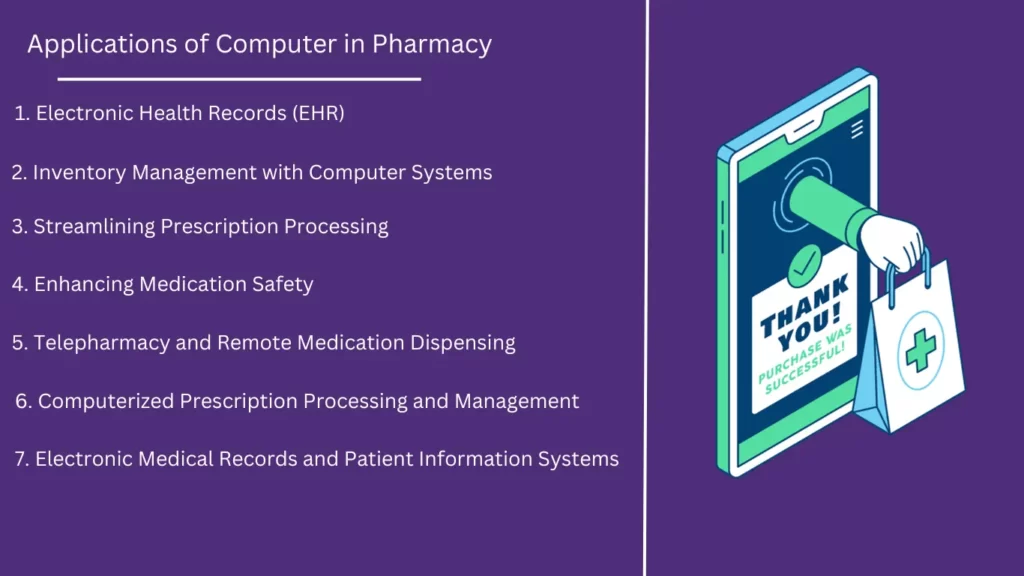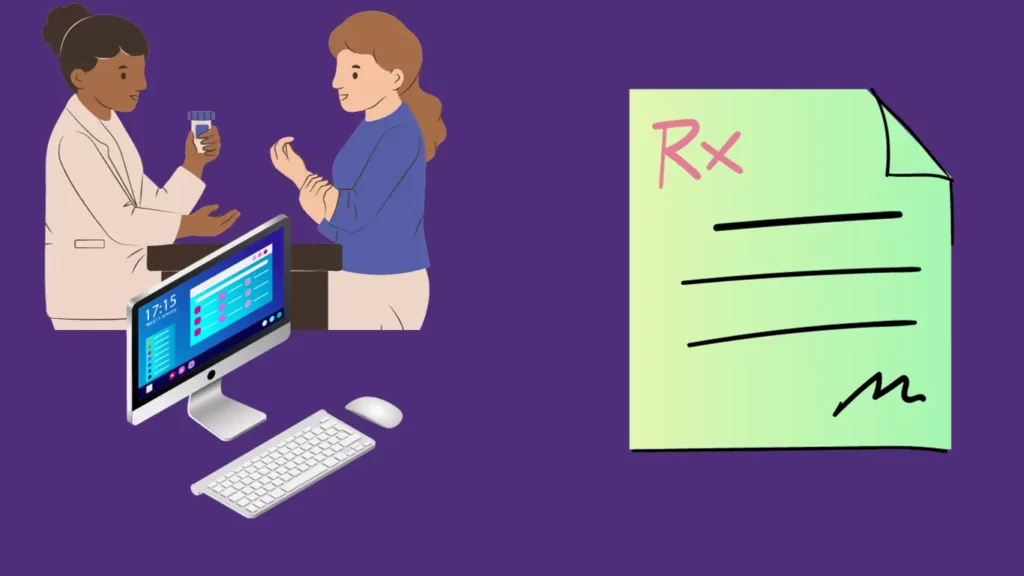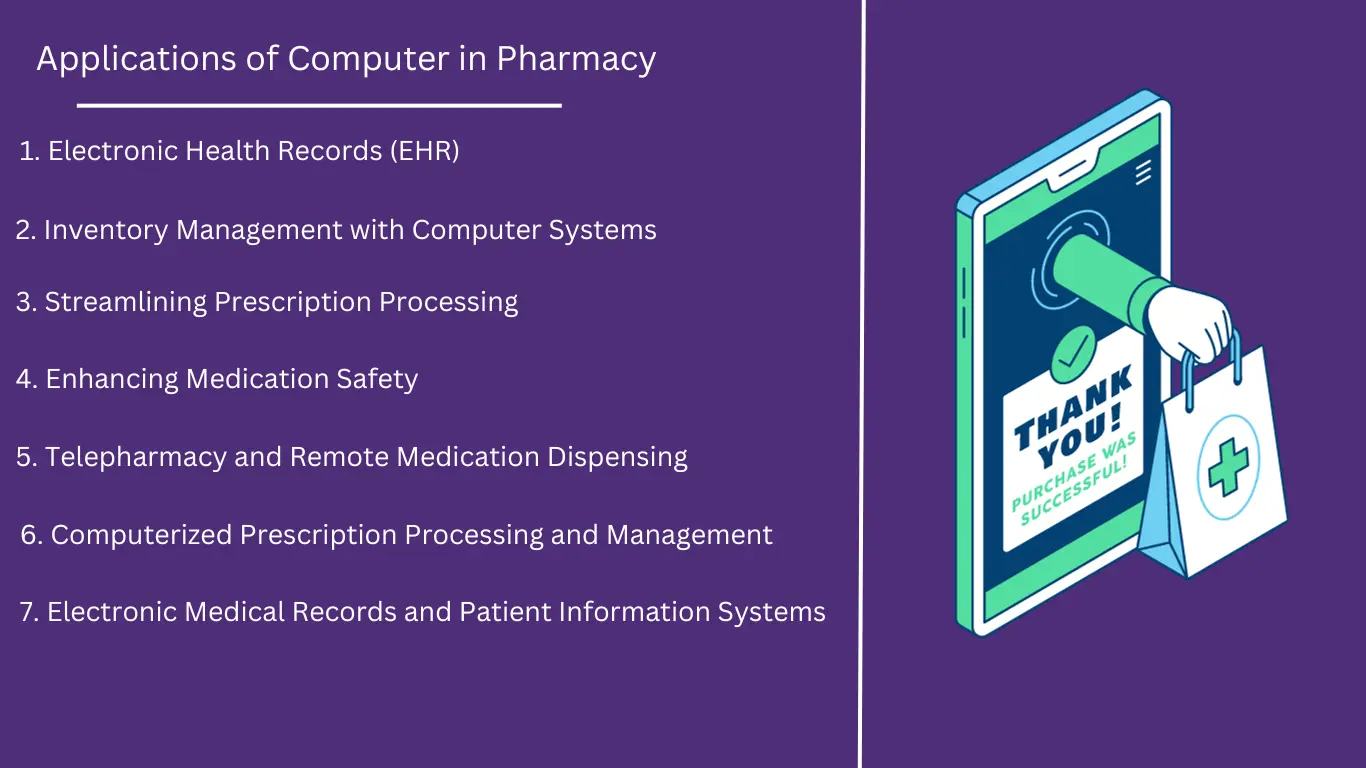Applications of Computer in Pharmacy: In today’s modern world, where technology has become an integral part of our lives, the pharmaceutical industry has also embraced the power of computers to streamline their operations. One such application is computerized medication dispensing systems, which have revolutionized how medications are dispensed in pharmacies.

Applications of Computer in Pharmacy
1. Electronic Health Records (EHR) in Pharmacy Management
EHRs have transformed the way patient information is stored and accessed, making it easier for pharmacists to provide personalized care and ensure medication safety. With the help of computers, pharmacists can now access patient information, such as medical history, allergies, and current medications, with just a few clicks.
EHR allows them to identify potential drug interactions, allergies, or contraindications before dispensing medications, reducing the chances of adverse drug events. EHRs also enable pharmacists to track medication adherence and monitor patient outcomes, ensuring that patients are receiving the most effective treatment.
2. Inventory Management with Computer Systems
. Computer systems have become invaluable tools in inventory management, allowing pharmacies to streamline their processes and optimize their inventory levels. Efficient inventory management is crucial for pharmacies to ensure that medications are always available and prevent stockouts
Computer systems can track medication inventory in real-time, providing accurate information about stock levels and expiration dates. This enables pharmacists to make informed decisions about reordering medications and prevents overstocking or understocking.
Overall, inventory management with computer systems has revolutionized the way pharmacies manage their medication stock. Computer systems allow for real-time tracking, automated ordering, and accurate forecasting, improving efficiency and preventing stockouts or overstocking.
3. Streamlining Prescription Processing
Computer applications have automated various aspects of prescription processing, from receiving prescriptions electronically to verifying insurance coverage and processing claims. Prescription processing is a critical task in any pharmacy, and computers have greatly streamlined this process, making it more efficient and accurate.
Computers can also automatically verify insurance coverage and process claims, making the billing process seamless and reducing the administrative burden on pharmacy staff. With the help of computers, prescriptions can now be received electronically from healthcare providers, eliminating the need for paper prescriptions. This not only saves time but also reduces the chances of errors due to illegible handwriting.
4. Enhancing Medication Safety through Computerized Systems
Medication safety is of utmost importance in the pharmaceutical industry, and computers have played a significant role in enhancing medication safety through various computerized systems. These systems have revolutionized the way medications are prescribed, dispensed, and monitored, reducing the chances of medication errors and improving patient outcomes.
Computerized systems also improve medication safety through their ability to provide drug allergy alerts. By storing patient allergy information in electronic health records, computers can flag potential medication allergies when medications are prescribed or dispensed. This ensures that patients are not exposed to medications that could cause an allergic reaction, reducing the risk of adverse events.
5. Telepharmacy and Remote Medication Dispensing
In recent years, telepharmacy and remote medication dispensing have emerged as powerful applications of computers in the pharmaceutical industry. These technologies have revolutionized the way medications are accessed and dispensed, particularly in underserved areas or areas with limited access to healthcare services.
Telepharmacy allows pharmacists to provide pharmaceutical care remotely, using computer and communication technologies. Pharmacists can remotely review and verify prescriptions, provide medication counseling, and monitor patient outcomes, all through secure online platforms. This enables patients in remote or rural areas to access the expertise of pharmacists without the need to travel long distances.
6. Computerized Prescription Processing and Management
Computerized prescription processing and management have become essential tools in modern pharmacies, streamlining the prescription workflow and improving efficiency and accuracy. With the help of computers, pharmacies can receive prescriptions electronically, process them quickly, and manage the entire prescription lifecycle efficiently.

Computerized prescription processing and management also allow for seamless communication between healthcare providers. Pharmacists can easily communicate with prescribers to clarify prescription details or request medication changes, reducing the chances of misunderstandings or errors.
Computers also enable pharmacists to access drug information databases and clinical decision support tools, ensuring that they have the most up-to-date information when processing prescriptions.
7. Electronic Medical Records and Patient Information Systems
Computers have made it easier for healthcare providers, including pharmacists, to access patient information, improve coordination of care, and ensure patient safety. The use of electronic medical records (EMR) and patient information systems has transformed the way patient information is stored, accessed, and utilized in the pharmaceutical industry.
With the help of computers, pharmacists can access electronic medical records and patient information systems to retrieve patient-specific information, such as medical history, allergies, and current medications. This allows them to make informed decisions about medication therapy, identify potential drug interactions or contraindications, and ensure patient safety.
8. Pharmaceutical Research and Development
Computers have played a significant role in advancing pharmaceutical research and development, enabling scientists and researchers to accelerate the discovery and development of new medications. The use of computers in research and development has revolutionized various aspects of the process, from drug discovery to clinical trials.
Computers can perform complex calculations and simulations to predict the efficacy and safety of potential drug candidates, saving time and resources in the drug discovery process. Computational drug design allows researchers to identify promising drug candidates and prioritize them for further investigation, reducing the number of compounds that need to be synthesized and tested.
9. Regulatory Compliance and Documentation
Computers have made it easier for healthcare providers, including pharmacists, to access patient information, improve coordination of care, and ensure patient safety. Regulatory compliance and documentation are critical aspects of the pharmaceutical industry, and computers have become indispensable tools in ensuring compliance and maintaining accurate records.
Computer systems can track and report adverse events, allowing pharmaceutical companies and regulatory agencies to monitor the safety of medications. These systems can collect and analyze data from various sources, including healthcare providers, patients, and clinical trials, identifying potential safety concerns and enabling timely intervention if necessary.

